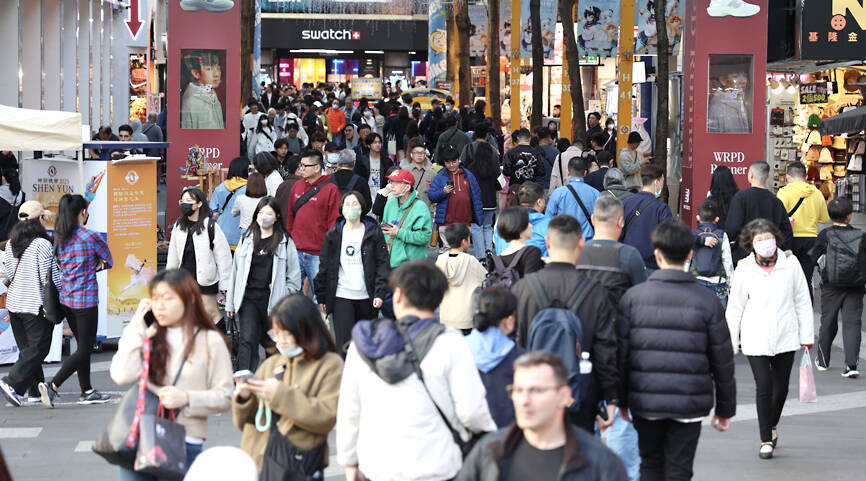Confidence in the local economy appeared mixed this month, with the index gauging current conditions rising, while another index assessing the economic outlook declined, Cathay Financial Holding Co (國泰金控) said on Thursday.
Citing a survey conducted from Feb. 1 to Feb. 7, Cathay Financial said about 29.3 percent of respondents thought the economy improved this month, while 35.7 percent felt it worsened.
That translated into an economic optimism index of about minus-6.4 this month, an improvement from minus-8.7 last month.

Photo: CNA
However, the economic optimism index for the next six months fell to minus-11.2 this month from minus-5.8 last month, following a decline in December leading indicators, the survey showed.
Amid volatility in global stock markets and US President Donald Trump’s tariff threats, the index measuring optimism toward the local stock market dropped sharply from 16.5 last month to 9.2 this month, the survey found.
Meanwhile, the index gauging the appetite for risk in the stock market increased slightly from 17.2 last month to 19.3 this month.
Cathay Financial said that 34 percent of respondents believed the tariff war could affect global trade and impact Taiwan’s economic growth, while 43.1 percent said the performance of US stock markets is expected to influence Taiwan’s equity market.
Respondents also projected GDP to grow 2.84 percent this year, with 53 percent expecting annual growth to be below 3 percent, it said, adding that it was more conservative than the Directorate-General of Budget, Accounting and Statistics’ (DGBAS) forecast of 3.29 percent.
Respondents expected growth in the local consumer price index (CPI) to reach 2.28 percent this year, with about 66 percent anticipating the CPI would average more than 2 percent for the year, above the central bank’s forecast, Cathay Financial said.
The DGBAS forecast that inflation would slow from 2.18 percent last year to 1.93 percent this year.

Taiwan Semiconductor Manufacturing Co (TSMC, 台積電) yesterday said that its investment plan in Arizona is going according to schedule, following a local media report claiming that the company is planning to break ground on its third wafer fab in the US in June. In a statement, TSMC said it does not comment on market speculation, but that its investments in Arizona are proceeding well. TSMC is investing more than US$65 billion in Arizona to build three advanced wafer fabs. The first one has started production using the 4-nanometer (nm) process, while the second one would start mass production using the

‘SILVER LINING’: Although the news caused TSMC to fall on the local market, an analyst said that as tariffs are not set to go into effect until April, there is still time for negotiations US President Donald Trump on Tuesday said that he would likely impose tariffs on semiconductor, automobile and pharmaceutical imports of about 25 percent, with an announcement coming as soon as April 2 in a move that would represent a dramatic widening of the US leader’s trade war. “I probably will tell you that on April 2, but it’ll be in the neighborhood of 25 percent,” Trump told reporters at his Mar-a-Lago club when asked about his plan for auto tariffs. Asked about similar levies on pharmaceutical drugs and semiconductors, the president said that “it’ll be 25 percent and higher, and it’ll

When an apartment comes up for rent in Germany’s big cities, hundreds of prospective tenants often queue down the street to view it, but the acute shortage of affordable housing is getting scant attention ahead of today’s snap general election. “Housing is one of the main problems for people, but nobody talks about it, nobody takes it seriously,” said Andreas Ibel, president of Build Europe, an association representing housing developers. Migration and the sluggish economy top the list of voters’ concerns, but analysts say housing policy fails to break through as returns on investment take time to register, making the

CHIP BOOM: Revenue for the semiconductor industry is set to reach US$1 trillion by 2032, opening up opportunities for the chip pacakging and testing company, it said ASE Technology Holding Co (日月光投控), the world’s largest provider of outsourced semiconductor assembly and test (OSAT) services, yesterday launched a new advanced manufacturing facility in Penang, Malaysia, aiming to meet growing demand for emerging technologies such as generative artificial intelligence (AI) applications. The US$300 million facility is a critical step in expanding ASE’s global footprint, offering an alternative for customers from the US, Europe, Japan, South Korea and China to assemble and test chips outside of Taiwan amid efforts to diversify supply chains. The plant, the company’s fifth in Malaysia, is part of a strategic expansion plan that would more than triple